Mental health in India is gaining long-overdue recognition, with increasing awareness and support at both individual and institutional levels. Global conversations around mental health are influencing a shift in India, where digital health solutions, corporate wellness programs, and youth-driven advocacy are creating an environment for mental health care to truly flourish. As accessibility expands and stigma diminishes, mental wellness is becoming a priority across the nation.
We solve the strategy behind scale!
India’s mental health landscape presents both immense challenges and opportunities. Currently, over 200 million people in India face mental health conditions, yet only 10-15% seek professional help. The gap highlights the need for scalable, accessible solutions—a need that is being met with innovative, digital-first approaches. This evolution presents a unique growth opportunity for companies poised to make a significant impact in this sector.
With our deep expertise in emerging sectors, Redseer is well-equipped to guide companies in capitalising on the rapid growth of India’s mental health market. Our insights and strategies can help businesses to create impactful solutions and unlock new growth in this evolving sector. As we delve deeper into the opportunities and trends shaping mental health in India, the potential for transformative growth becomes increasingly clear.
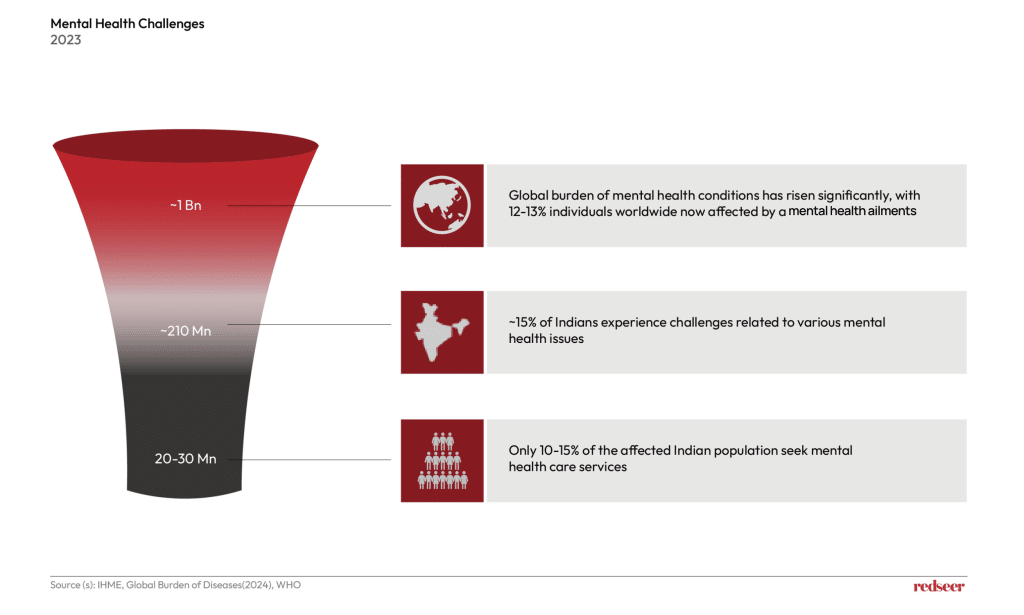
A Widespread Yet Underserved Need
As awareness of mental health expands, the scale of the challenge in India comes into sharper focus. Nearly 15% of the population faces mental health conditions, from anxiety to neurodevelopmental disorders, creating substantial economic impacts. The WHO estimates a potential productivity loss of $1 trillion globally every year due to untreated mental health conditions.
Despite this, access to mental health services remains limited. As per the National Health and Morbidity Survey, India has a 70-90% treatment gap for various disorders, with only 0.9 psychiatrists and psychologists per 100,000 people in 2023 based on Redseer’s estimate. However, the government’s recent initiatives, such as the National Tele Mental Health Program, are helping bridge this gap, handling over 1.45 million calls through Tele MANAS by 2024.
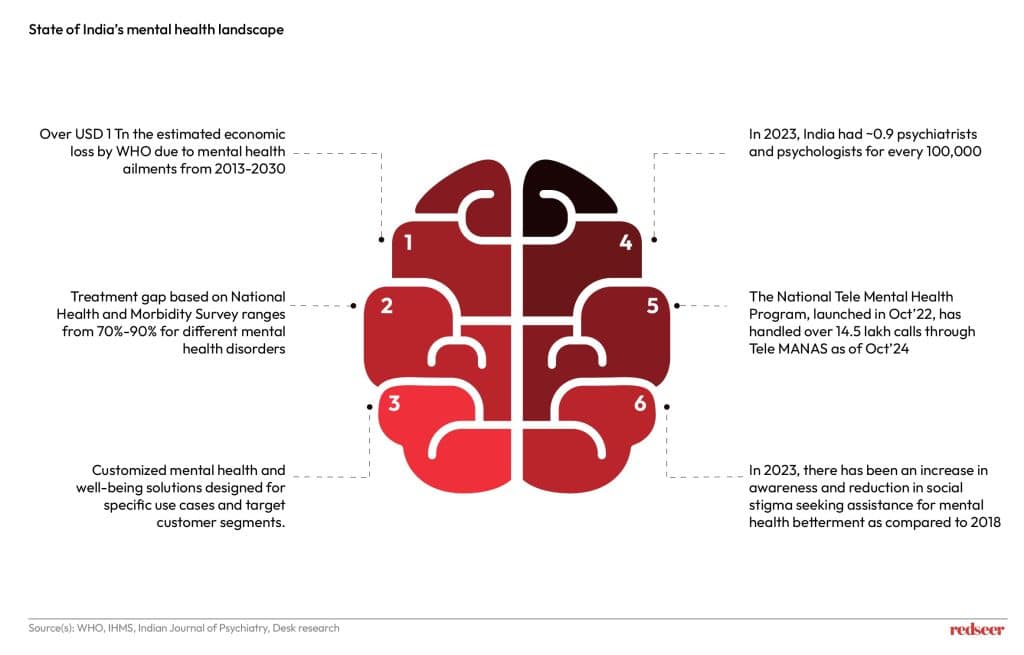
This substantial unmet need has paved the way for innovative digital solutions, which are now emerging as critical tools in expanding mental health care access.
Digital Solutions Expanding Access
In response to India’s mental health challenges, digital solutions have quickly become vital in bridging accessibility gaps. Companies are addressing mental healthcare needs through two primary business models: B2B2C (business-to-business-to-consumer) and B2C (direct-to-consumer). The B2B2C model includes partnerships with educational institutions, corporations, and rehabilitation centers, providing mental health support through structured programs. This approach helps to combat productivity loss due to mental health issues, particularly within corporate environments, which have shown increased interest in employee mental wellness.
Meanwhile, the B2C segment is expected to see strong growth in the coming years as demand for accessible mental health solutions continues to rise. A key driver behind this growth is the rising demand from caregivers of children with neurodevelopmental conditions. With 9.2% of children aged 2-6 and 13.6% of those aged 6-9 affected by neurodevelopmental issues like autism, learning disability, speech disorders, and ADHD, digital mental health solutions are offering caregivers accessible and essential resources to support their children’s developmental needs.
As these digital platforms evolve, enterprise-driven segments are also witnessing substantial growth, creating complementary opportunities in the broader mental health ecosystem.
spending due to macroeconomic and regulatory challenges. The automobile industry enjoyed increased ad spend driven by new vehicle launches, and the travel and hospitality sector expanded its ad budget post-pandemic.
Enterprise-Driven Market Growth
Alongside the rise in digital adoption, the enterprise-driven B2B2C mental health market is projected to reach approximately USD 3.9 billion by FY29, with demand expected to grow 1.7x in the coming years. Corporate and educational segments are leading this shift, recognizing the critical role of mental health in productivity and educational success.
The corporate sector has been proactive in implementing mental wellness programs, as companies increasingly see the connection between mental health and productivity. Large enterprises are investing in programs that address employee well-being, highlighting a growing market for corporate mental health solutions.
In the educational sector, institutions are integrating social-emotional learning (SEL) programs aimed at building empathy, self-awareness, and interpersonal skills in students. The SEL segment within educational institutions is expected to grow at a CAGR of 16% from FY24 to FY29, reflecting a rising commitment to mental health awareness in schools and colleges.
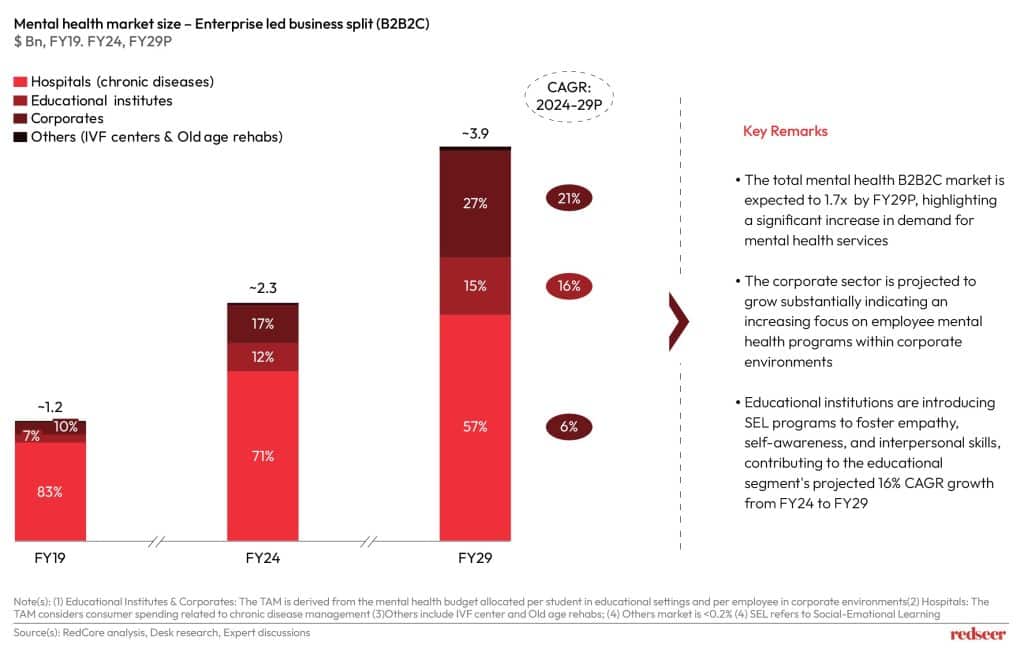
As mental health becomes a key focus for these segments, understanding the varied adoption levels across different markets can help reveal further growth opportunities
Segmentation and Adoption Across Key Market Segments
The adoption of mental health services varies significantly across sectors, highlighting unique needs and opportunities within each segment. Understanding these differences reveals the potential for growth across educational institutions, corporate environments, and healthcare:
- Educational Institutions: While premium schools are integrating mental health programs into their curriculum, adoption remains low in other schools and universities. However, recent government mandates now require coaching centers to include counselling services, driving stronger adoption in these settings and highlighting an area of growth potential.
- Corporate Sector: Large corporations and multinationals lead the adoption of mental wellness programs, with budgets of INR 10-20K per employee for well-being initiatives. However, only a small percentage of this budget currently goes toward mental health, though this allocation is steadily increasing. Mid-sized companies show moderate adoption, while small-sized firms have yet to invest significantly in these services.
- Hospitals: In the hospital sector, mental health adoption is limited within chronic disease management. However, when doctors prescribe mental health support, high usage and uptake are observed. This segment represents an untapped market, particularly among private hospitals as awareness grows.
With adoption varying widely across sectors, demand for business-to-consumer solutions has also continued to grow, meeting the needs of underserved segments.
Increasing Demand for Business-to-Consumer Mental Health Services
To address the wide-ranging needs of India’s mental health market, B2C services have been steadily growing. The B2C is projected to expand 1.4x by FY29, driven by heightened awareness, particularly among parents concerned about neurodevelopmental disorders, which affect brain development and function. With around 2.9 to 3.2 million children affected by these conditions, offline counseling and neurodevelopment centers are expected to play a crucial role in the future.
Digital platforms offering therapy and counseling are becoming essential tools in meeting the mental health needs of a diverse population.
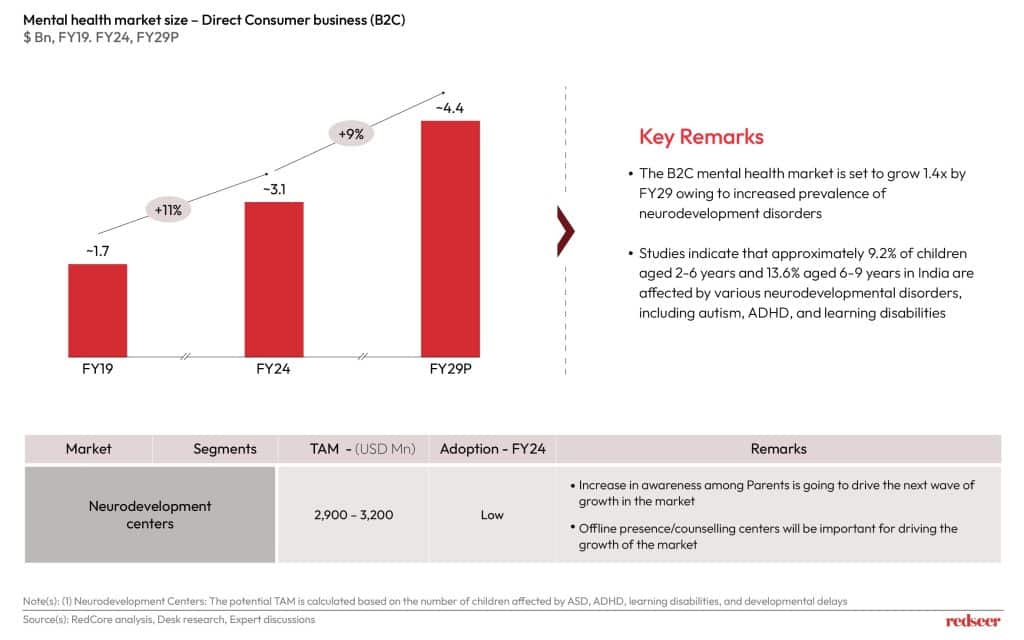
As digital platforms and B2C services evolve, a diverse landscape of mental health companies has emerged to cater to a range of needs
A Landscape of Innovation and Growth
India’s mental health sector is expanding rapidly, with companies offering diverse solutions tailored to specific needs across demographics. From one-on-one counseling and self-care tools to community support, corporate wellness programs, and specialized childcare services, these offerings reflect the sector’s responsiveness to varied consumer demands and a commitment to broadening accessibility.
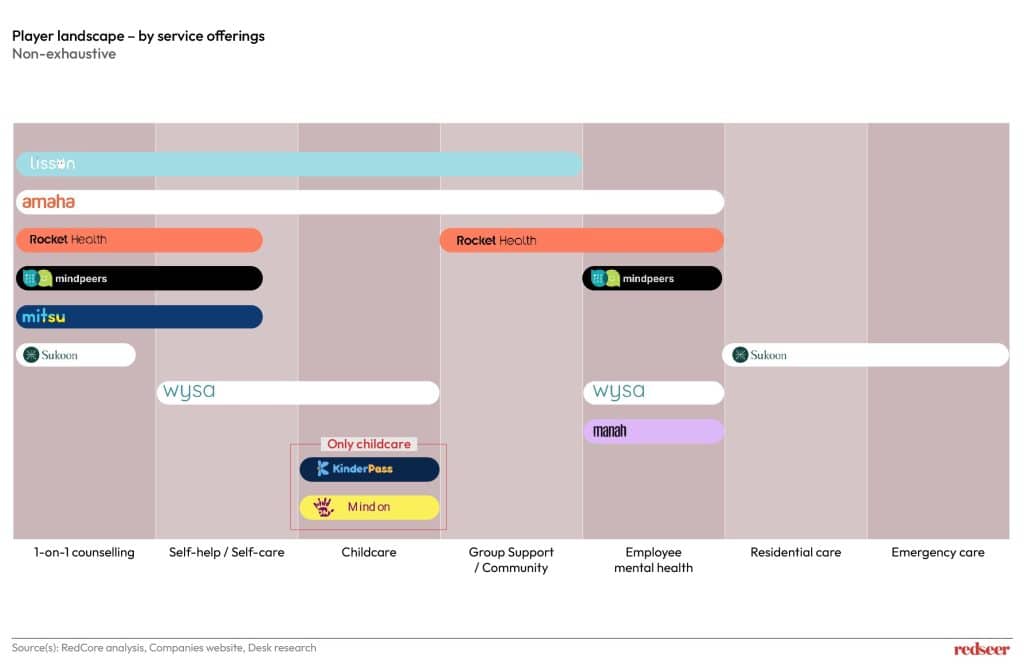
This broad spectrum of services highlights the innovation within India’s mental health landscape. Companies addressing needs across individual, group, childcare, and corporate wellness are creating greater access and helping to destigmatize mental health care across the country.
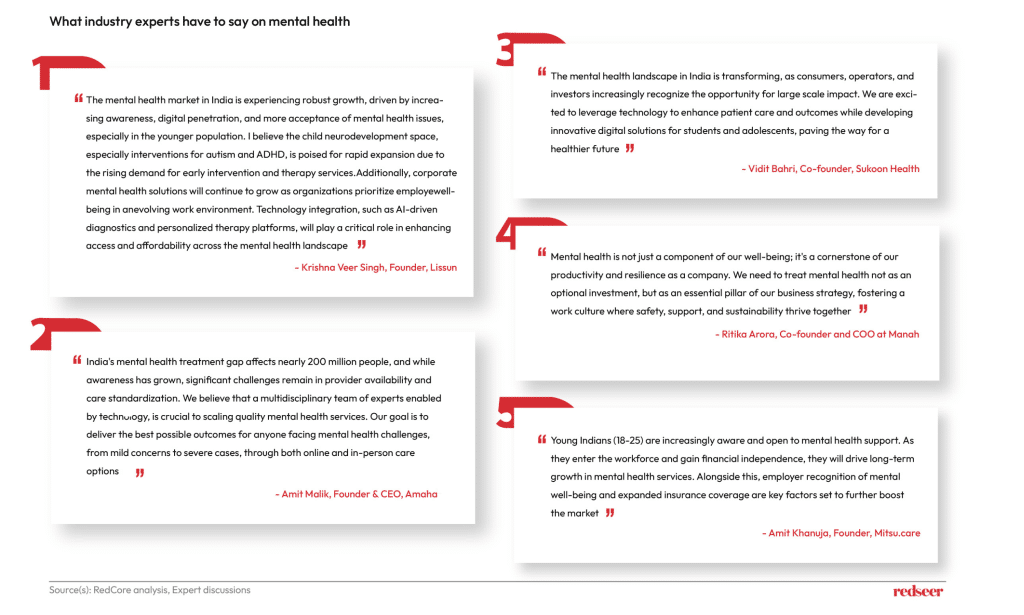
Opportunities and Future Outlook
As India’s mental health sector expands, opportunities for growth and innovation abound. Rising demand for affordable, accessible mental health services, along with increasing openness to digital therapy, creates a strong foundation for companies looking to enter or expand in this space. By investing in quality services and targeting underserved segments, businesses can make a transformative impact, shaping the future of mental health care in India.
At Redseer Strategy Consultants, we are continually analyzing the trends and growth patterns within India’s mental health sector. Our in-depth market insights and strategic guidance help businesses navigate this evolving landscape, identifying opportunities to enhance accessibility, scale innovative solutions, and expand into underserved segments.
Unlock the potential of India’s mental health market. Reach out to our team for strategic insights, or download our latest report for a comprehensive analysis of trends and opportunities in the sector.








